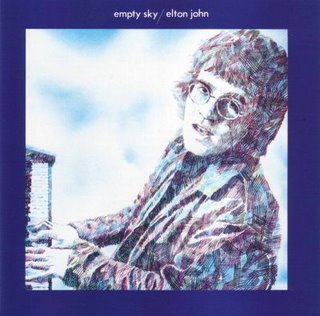
Empty Sky's Front Cover
This album is surprising to many people, if only because they believe Elton’s first release was the eponymous record that surfaced the following year. And it is all the more surprising because it is a considerably good album for a first attempt, or at least one whose ambition can’t be vetoed. It also has the distinct advantage of never having been overplayed like his other records, and that makes listening to it a refreshing task.
The whole album was composed by Elton and Bernie. It was produced by Steve Brown, the man who to a certain extent “discovered” them and suggested they began recording songs for themselves instead of being just hired hands for other Dick James Music artists.
As I said above, “ambitious” is the word that best sums it up. Elton threw all the darts at the target at once, and as it was only natural some were to stick while others were to miss the mark entirely. One of the key elements of Elton’s classic albums is present here: the willingness to experiment. The track that gives the album its name, and the one that opens it makes that evident from square one. Before listening to it, I was sure that the album would begin with Elton’s piano. Wrong. “Empty Sky” is heralded by a percussive attack, and the instrument one remembers the most from the whole song might just as well be the flute that connects passages.
Other songs that work pretty well include “Western Ford Gateway” (evidencing Bernie’s interest in the Far West, a theme he was to indulge in shortly), and the harpsichord-driven “Skyline Pigeon”, a song that Elton would rerecord by the time of the “Don’t Shoot Me – I’m Only The Piano Player” album. The song is a moving declaration of freedom that seems to echo the old belief that if you love something you must let it go. As Rabindranath Tagore once wrote, the ones who truly love are those who know the secret of detachment.
As regards the least memorable songs on the album, these are the ones were Elton hasn’t yet found his voice, the most obvious case being “Lady, What’s Tomorrow”. Also, a problem that would characterize some of Bernie’s compositions is palpable here, namely aiming far too high – “Valhalla” and “The Scaffold” are examples of this, and the latter in particular is too labyrinthine for anybody to get into. And we know that Bernie was seldom one to give explanations to Elton about his lyrics. They worked fantastically as a composing unit maybe because of that. Remember, words belong half to the one who says them, and half to the one who listens to them. Bernie always let Elton make his own readings, and I believe which that is motivating in the long run, as the creative process is democratized. I always do the same with the bands I work with as a lyricist.
The CD remaster deserves praise since four excellent songs are added, including the singles “Lady Samantha” and “It’s Me That You Need”. The former arose a bit of interest even if it wasn’t a big seller, while the latter announced the forthcoming breakthrough album production-wise, with a full string section backing Elton.
The album went mostly unnoticed when it was first released in 1969. It would be released in the States in the mid-70’s, during Elton most successful days as a performing artist, and it reached the Top 10. While it is not indispensable in any sense, it is certainly interesting to see John’s connections to 60’s music in such an evident light. While the next record would bring recognition and successes with it, I must admit that in certain (and very very specific) places I prefer “Empty Sky” over “Elton John”. Because it conveys even more ambition. This ambition would be toned down on “Elton John”, and as everything was placed in a better perspective John’s first triumphs were to materialize.
And you? How do you feel? Let us all know in the comments.
Rating: 6.5/10

Pingback: Elton John – Album Review (Part 1) | MusicKO
Pingback: Don’t Shoot Me I’m Only The Piano Player (Elton John) – Album Review | MusicKO
I pretty much believe Elton was struggling his way out lots of songwriters’ influence: namely (and surprisingly!) Tim Buckley’s -“Empty Sky”, “Hymn 2000”, “Scaffold”- Leonard Cohen’s (“Lady”).
If not enough, I see traces of Joplin (“Sails), Lennon (“Western…”) and…Aphrodite’s Child’s Vangelis (“Valhala” and “Lady Samantha”).
I know it may sound crazy, but Elton was really pushing all the buttons (I hear no Nyro’s influence though, which he often underlines in the interviews).
I rate ES 6/10.